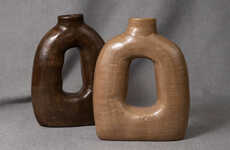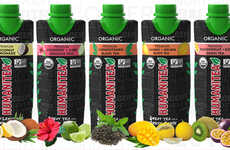
Tekoha Promotes Sustainable Development for Brazilian Artisans
Tiana Reid — May 6, 2011 — Social Good
References: redetekoha.br & clearlyso
Tekoha is a social enterprise that sells handicrafts made by people living in low-income communities in Brazil. Many of the communities that Tekoha works with are located in environmentally volatile areas that are affected by ecological issues like Amazon preservation. Artisan products made with Tekoha are sold both in Brazil and to fair trade stores in a variety of countries including Poland, France and Switzerland.
Tekoha's story begins in April of 2007, as it started out as an NGO working to assist people in selling their artisan products and goods. As of September 2008, Tekoha changed routes and became an enterprise that emphasized their retail efforts on corporate and export-oriented distribution channels. In 2010, Tekoha partnered with Artesol, a Brazilian community development NGO, so that the two organizations could work together to further the fair trade idea throughout Brazil. To date, corporate gifts and exports are still Tekoha's main business goals—it is in this way that Tekoha can make the most of its business model and increase returns to the artisan communities.
While adhering to the triple bottom line, Tekoha sells a range of products to its retail, online, export and business-to-business clients including home décor, women's accessories, corporate gifts and kits. All of Tekoha's products are locally-sourced and use eco-friendly material (either recycled or biodegradable). What's more, many of Tekoha's products are culturally rich, reflecting the artisans' history and daily life, and subsequently, are embedded in Brazilian social relations. Tekoha works in almost forty distinct communities in Brazil, and thus, the network of community development is integral to both the business side and the social side of Tekoha's model. Most interestingly, each Tekoha product has a remarkable story behind it, making it more than just a commodity, but a good that is possibly filled with meaning and cultural value—depending on the consumer.
For many of the women that work with Tekoha, the social enterprise operates as an important source of social capital, linking them with networks that they may not have otherwise had access to. By targeting conscious consumers, Tekoha is able to extract the value-added that many Western countries typically place on fair trade products and give it back to the low-income artisan communities in Brazil that are in need of market information and social capital.
Contact Information:
Tekoha Website
R Fradique Coutinho, 914 - sala 2
São Paulo, SP
Brazil
05416001
Tekoha's story begins in April of 2007, as it started out as an NGO working to assist people in selling their artisan products and goods. As of September 2008, Tekoha changed routes and became an enterprise that emphasized their retail efforts on corporate and export-oriented distribution channels. In 2010, Tekoha partnered with Artesol, a Brazilian community development NGO, so that the two organizations could work together to further the fair trade idea throughout Brazil. To date, corporate gifts and exports are still Tekoha's main business goals—it is in this way that Tekoha can make the most of its business model and increase returns to the artisan communities.
While adhering to the triple bottom line, Tekoha sells a range of products to its retail, online, export and business-to-business clients including home décor, women's accessories, corporate gifts and kits. All of Tekoha's products are locally-sourced and use eco-friendly material (either recycled or biodegradable). What's more, many of Tekoha's products are culturally rich, reflecting the artisans' history and daily life, and subsequently, are embedded in Brazilian social relations. Tekoha works in almost forty distinct communities in Brazil, and thus, the network of community development is integral to both the business side and the social side of Tekoha's model. Most interestingly, each Tekoha product has a remarkable story behind it, making it more than just a commodity, but a good that is possibly filled with meaning and cultural value—depending on the consumer.
For many of the women that work with Tekoha, the social enterprise operates as an important source of social capital, linking them with networks that they may not have otherwise had access to. By targeting conscious consumers, Tekoha is able to extract the value-added that many Western countries typically place on fair trade products and give it back to the low-income artisan communities in Brazil that are in need of market information and social capital.
Contact Information:
Tekoha Website
R Fradique Coutinho, 914 - sala 2
São Paulo, SP
Brazil
05416001
Trend Themes
1. Sustainable Development - Disruptive innovation opportunity: Develop new sustainable materials and production methods for handicrafts.
2. Fair Trade - Disruptive innovation opportunity: Utilize technology to create transparent supply chains for fair trade products.
3. Social Capital - Disruptive innovation opportunity: Develop platforms or networks to connect artisans with potential customers and business opportunities.
Industry Implications
1. Handicrafts - Disruptive innovation opportunity: Apply automation or digital tools to enhance the production and distribution of artisan products.
2. Home Decor - Disruptive innovation opportunity: Incorporate smart home technology into sustainable and culturally rich home decor products.
3. Corporate Gifting - Disruptive innovation opportunity: Create personalized and ethically sourced corporate gift solutions using innovative materials and designs.
3.8
Score
Popularity
Activity
Freshness























